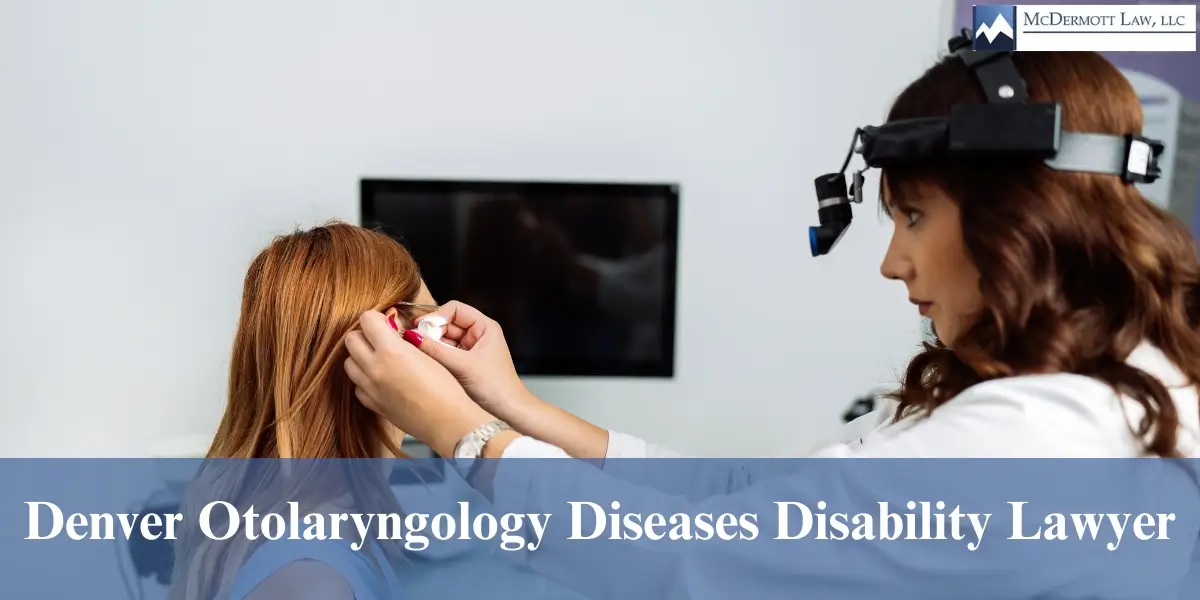Denver Otolaryngology Diseases Disability Lawyer
Denver Otolaryngology Diseases Disability Attorney
Meniere’s Disease is a disorder of the inner ear that causes spontaneous episodes of vertigo — a sensation of spinning — along with fluctuating hearing loss, ringing in the ear (tinnitus), and sometimes a feeling of fullness or pressure in your ear. If you are experiencing these symptoms, our expert lawyers team at McDermott Law, LLC is here to help. Our skilled Denver Otolaryngology Diseases Disability Lawyer can assist you in pursuing the compensation you deserve for the impact Meniere’s Disease has on your life.

Otalgia
Otalgia, also known as an earache, is pain in the ear. There are two main types of otalgia:
Primary otalgia is pain that originates as the result of pathology within the ear itself. Examples of primary otalgia include external otitis, otitis media, mastoiditis, and auricular infections. Diagnosis of these conditions is fairly straightforward, and standard treatment generally alleviates the problem. However, individuals with primary otalgia may also experience complications related to other conditions, such as central retinal vein occlusion (CRVO), which can affect vision and overall quality of life.
Referred otalgia arises from non-otological disease. Referred otalgia can be the result of a vast number of problems ranging from dental issues to a more serious condition requiring immediate diagnosis and intervention. Because of this, physicians must use a structured, systematic approach to identify the etiology of the patient’s pain. A comprehensive history and exhaustive physical examination are crucial components of this approach. The findings of the history and physical examination will determine what interventions or additional testing may be indicated.
Sheri J. Polley, ‘Doctor, My Ear Hurts’: Diagnosing Referred Otalgia, ENT Today (Apr. 1, 2008), http://www.enttoday.org/article/doctor-my-ear-hurts-diagnosing-referred-otalgia/
Otosclerosis
Otosclerosis is an abnormal sponge-like growth in the middle ear that causes hearing loss. This growth prevents the ear from vibrating in response to sound waves. Such vibrations are needed in order to hear. Otosclerosis may slowly get worse.
Otosclerosis. Mount Sinai. https://www.mountsinai.org/health-library/diseases-conditions/otosclerosis
Sensorineural Hearing Loss (SNHL)
Sensorineural hearing loss (SNHL) is caused by the death of or damage to the tiny hair cells in the cochlea. This can be caused by certain diseases such as meningitis or multiple sclerosis, or due to use of certain drugs like aspirin, quinine, or streptomycin. (SNHL) has many different presentations, ranging in severity from mild to profound, including low and high pitch patterns. Genetic hearing loss may appear as an isolated finding or as part of a syndrome. About 70% of genetic hearing loss is non-syndromic, and about 30% is syndromic.
https://www.hear-it.org/Sensorineural-hearing-loss
Tinnitus
Tinnitus is the perception of noise or ringing in the ears. Tinnitus isn’t a condition itself – it’s a symptom of an underlying condition, such as age-related hearing loss, ear injury, or a circulatory system disorder. There are two kinds of tinnitus:
i. Subjective Tinnitus
is tinnitus only you can hear. This is the most common type of tinnitus. It can be caused by ear problems in your outer, middle, or inner ear. It also can be caused by problems with the hearing (auditory) nerves or the part of your brain that interprets nerve signals as sound (auditory pathways).
ii. Objective Tinnitus
is tinnitus your doctor can hear when he or she does an examination. This rare type of tinnitus may be caused by a blood vessel problem, a middle ear bone condition, or muscle contractions.
Tinnitus, Mayo Clinic (Mar. 3, 2018), https://www.mayoclinic.org/diseases-conditions/tinnitus/symptoms-causes/syc-20350156
Traumatic Endolymphatic Hydrops
Traumatic endolymphatic hydrops is an accumulation of endolymph – the fluid in the membranous labyrinth of the ear – in the cochlear duct caused by traumatic insult. This is caused by fistulization of the bony labyrinth, direct injury to the membranous labyrinth, and injury to the endolymphatic fluid drainage system. The diagnosis of traumatic endolymphatic hydrops is made by a history of trauma, such as barotrauma, a blow to the head, or perhaps a previous ear operation, such as stapedectomy.
Shea Clinic, Traumatic Endolymphatic Hydrops, Pub Med, https://www.ncbi.nlm.nih.gov/pubmed/8572126
Vertigo
i. General
Vertigo is a sensation of spinning. If you have these dizzy spells, you might feel like you are spinning or that the world around you is spinning. Vertigo may be associated with head or neck injury. Vertigo is often triggered by a change in the position of your head. People with vertigo typically describe it as feeling like they are spinning, tilting, swaying, unbalanced, pulled to one direction. Other symptoms that may accompany vertigo include feeling nauseated, abnormal or jerking eye movements (nystagmus), headache, sweating, ringing in the ears or hearing loss.
Vertigo, WebMD, https://www.webmd.com/brain/vertigo-symptoms-causes-treatment#1
ii. Benign Paroxysmal Positional Vertigo (BPPV)
Benign Paroxysmal Positional Vertigo (BPPV) is one of the most common causes of vertigo; the sudden sensation that you’re spinning or that the inside of your head is spinning. It is characterized by brief episodes of mild to intense dizziness. Symptoms of benign paroxysmal positional vertigo are triggered by specific changes in the position of your head, such as tipping your head up or down, and by lying down, turning over, or sitting up in bed. You may also feel out of balance when standing or walking, especially in Denver, where environmental factors such as altitude and pressure changes can sometimes exacerbate symptoms of vertigo.
Contact Us
For more information about your legal rights and entitlements, along with a professional evaluation of your potential case, set up a free Review of Denied Claims by calling us at 303-964-1800, or complete our contact form. We offer free Review of Denied Claims and represent clients throughout the Denver area and the Rocky Mountain region.
Get A Free Case Evaluation of Your Denied Claim
Fields Marked With An “*” Are Required



